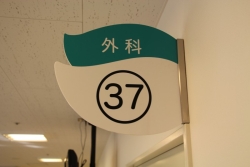
It is difficult to examine the small intestine. However, such examinations have recently become possible via a capsule endoscope or double bulb endoscope. (For more information, please refer to “Gastroenterology”). When surgical operation is required, it is performed mainly by laparoscopic surgery. Because of the westernization of dietary habits, incidences of colorectal cancer are on the rise. The death rate from colorectal cancer, for both men and women, is among the highest of any form of cancer. However, colorectal cancer is comparatively more curable when detected at an early stage. So, we recommend to have a medical checkup and promptly visit us for a consultation if you experience symptoms like abdominal pain, constipation, or diarrhea.
There are two primary methods of treatment for colorectal cancer: endoscopic treatment and surgery. When endoscopic treatment is not possible (judged by size and depth of cancer), surgery will be performed. Fukuyama Medical Center is certified by The Japan Society of Coloproctology, and leads in the number of surgical cases throughout Hiroshima Prefecture. In 2013, we performed 138 cases of colorectal cancer surgery, of which 81 cases used laparoscopic surgery. When we first implemented laparoscopic surgery, it was only used for early-stage cancers, but now progressively use laparoscopic surgery for advanced canders as well. Compared to conventional open surgery, laparoscopic surgery leaves much smaller scars of four to five centimeters. With less postoperative pain, recovery times are minimized, and some patients can leave the hospital as early as 10 days after surgery.
For rectal cancer cases, we strive to provide surgical treatment which avoids installing a stoma (artificial anus) whenever possible. For unresectable rectal cancer, we perform treatment by the combination of various anticancer drugs and new molecular targeted drugs. Treatment policies are determined at our weekly gastrointestinal conference.